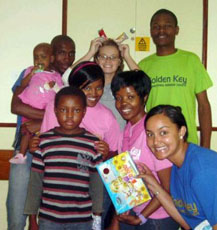 |
The Golden Key UFS Chapter Executive Committee during one of their community projects. Here are, from the left back: Billy Tshanjane, Mitz Dames and Lehlohonolo Mofekeng; middle: Keneiloe Kgnare and Siphe Mahlaba; front: Kim Drude.
26 July 2012 |
The world’s largest academic honour society, Golden Key International Honour Society, has again recognised excellence at the university, awarding the University of the Free State (UFS) chapter an International Chapter Service Award.
It is the third consecutive year that the chapter has received the award which is awarded to ten of the more than 375 chapters worldwide. Based on the society’s values of academic excellence, leadership and community service, the chapter was awarded 1000 US dollars (about R8400).
In March this year, the chapter received another accolade when Dr Derek Swemmer, Registrar and co-advisor of the chapter, was appointed chairperson of the governing body of the society. Dr Swemmer became the first South African to serve in this position of this prestige academic society.
Kim Drude, Golden Key UFS Chapter President, says the chapter will continue making a difference in the community. “We may now go out there and make the changes at our current major community service project, the Talita Cumi Orphanage Home and School.
"Commitment and dedication will always be rewarded and this award is an indication that our hard work has, without a doubt, paid off.”